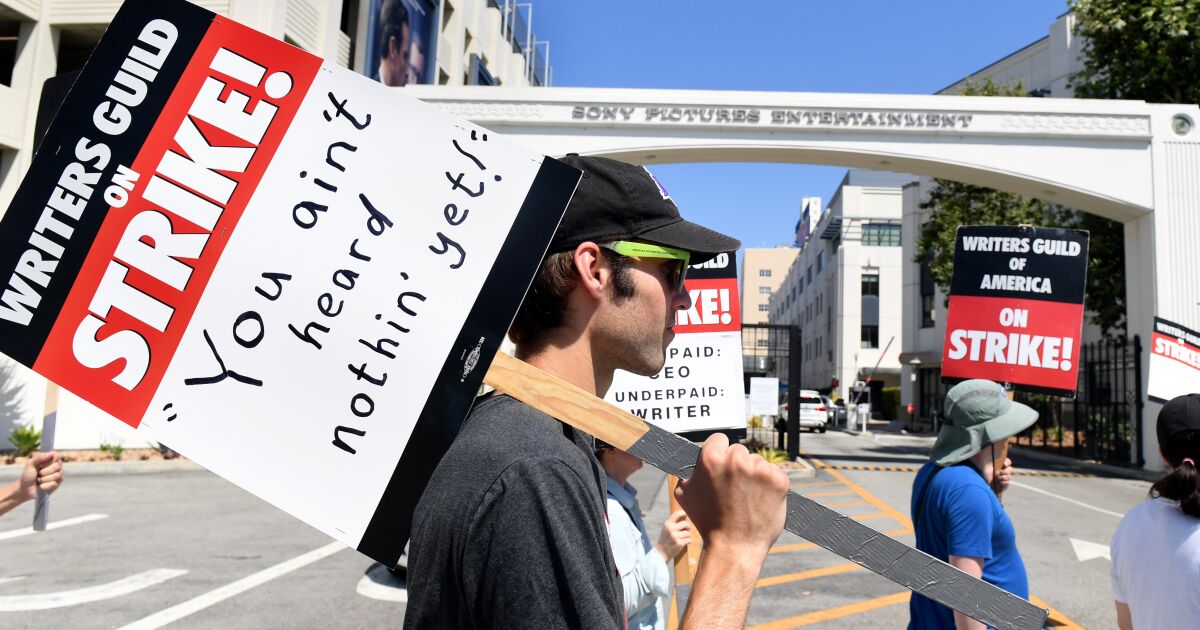Getting $900,000 a year to run artificial intelligence projects for Netflix would have been a staggering sum even before two of Hollywood’s major unions went on strike.
But now that both the Writers Guild of America and SAG-AFTRA are picketing outside Netflix headquarters to protest falling streaming pay and mounting automation, this job listing seems like a clear symbol of where the entertainment industry currently is — and where it’s headed.
Role of Product Manager – Machine Learning Platform, It was first reported on By Intercept, $300,000-$900,000 salary range for work focused on prioritizing and managing projects related to the broadcast giant’s AI program.
And Netflix is not alone. Disney TV named recruitment for Senior Vice President “At the forefront of technological developments, such as artificial intelligence.” Sony is seeking appointments related to AI ethics. And Amazon Prime Video and CBS are both looking to fill AI-related roles, such as Hollywood Reporter I mentioned recently.
As technology improves and investment capital pours in, stakeholders across the entertainment world are looking to add artificial intelligence to the production pipeline in an effort to reduce costs and increase efficiency. Startups have popped up that promise to change actors’ dialogue, make stunts safer, “revive” dead actors and more.
Tinseltown appears to be in the midst of an artificial intelligence boom — even as its creative class seeks to impose limits on how the technology can be deployed.
“It certainly seems like these are high-level, strategic positions based on the type of compensation that is being offered to them,” Duncan Crabtree-Ireland, SAG-AFTRA National Executive Director and Chief Negotiator, said of the job listings. “In terms of a broader AI strategy or focus on using generative AI, that’s not something we’ve seen before.”
Crabtree-Ireland added that these roles may not be geared towards strikebreaking but rather to “create a post-strike dynamic around the AI”. “These are the ones who are looking to the future and trying to be strategic.”
Some recent job listings are for fairly traditional roles in the tech world, such as software engineers (who write code) and product managers (who direct projects to completion). And not many of them seem to directly touch the course of content development that has so worried the amazing writers and actors.
However, the breadth of the range of open roles – and the excellent salaries they tout – indicate a growing embrace of this technology by the world of film and television.
At Netflix, for example, The Times has identified more than a dozen active job offers on LinkedIn in which the Los Gatos-based streaming platform has sought AI experience. Among those jobs were a technical director for AI R&D (suggested salary: $450,000 to $650,000), a globalization-focused machine learning scientist ($150,000 to $750,000) and a machine learning software engineer ($100,000 to $700,000).
The $900,000 Machine Learning Product Manager role listing at one point mentioned that AI helps Netflix “create great content,” according to The Intercept. However, that wording has disappeared as of Monday.
Netflix declined to comment for this story.
Meanwhile, Sony was looking for a research scientist for its AI ethics group as well as a technical program manager for AI ethics. Both roles are part of Sony Group Corp. Headquartered in Tokyo, whose businesses include Sony Pictures Entertainment Inc. and Sony Interactive Entertainment.
The Sony Group created AI ethics guidelines in 2018, and in 2021, it opened an AI ethics office, according to the company’s website.
“One of the main responsibilities of an AI ethicist…is to improve the engineering approach to AI by adding ethical, social, and political perspectives,” books Bina Ammanath, CEO of the Global Deloitte AI Institute, in a blog post. Other key responsibilities include advising on ethical AI practices, protecting against unintended consequences of AI misconduct and ensuring accountability for AI-related decisions and actions.
Spot engineers—specialists in adjusting instructions given to an AI system—are another job category emerging from the AI boom.
In April, actor and writer Donald Glover announce that his creative studio was hiring for an AI Prompt Engineer as well as an “AI Prompt Animator”.
“There has been a noticeable push by traditional Hollywood firms, as well as some of the more modern studios and broadcasting companies, that are looking to increase their AI capabilities,” said Josh Pendrick, CEO of Rypplzz, a startup working to make celebrities artificially intelligent. hologram. Pendrick said that push predates the Hollywood strikes but has grown since labor action began.
“AI roles in content creation and design are in high demand right now and show no signs of slowing down,” he added.
When asked about Hollywood’s increasing focus on AI, Scott Rowe, a representative for the Motion Picture and Television Producers Alliance — which represents studios in labor negotiations — pointed to the group’s previously published positions on the technology.
Regarding screenwriting, AMPTP said, “AI raises difficult and important creative and legal questions for everyone” and that an AI-generated script is not eligible for writing credit. When it comes to acting, the coalition has advocated for informed consent and fair remuneration in cases where actors are digitally replicated.
Several industry insiders have pointed out that Hollywood has been hiring for positions in artificial intelligence since before the strikes began. After all, AI has been available to creators for years — in 2018 it was a Lexus commercial Written by Amnesty International — and the industry is already using AI for things like making actors look younger and matching dubbed words to on-screen mouth movements.
Artificial intelligence plays a role off camera elsewhere in the industry, as does the Netflix recommendation algorithm.
SAG-AFTRA member Lea Caruana, recently he told the Times that she had already undergone two full body scans in order to digitize her body for inclusion in the background scenes.
Such “cloning” of AI was of particular concern to many SAG-AFTRA members.
said attorney Mark Simon, head of entertainment and sports law at Fox Rothschild.
Simon’s client, actor Joe Pesci, appeared in the 2019 Netflix movie “The Irishman,” where CGI was used to make Pesci’s character look younger. “It was extremely important to me and (Pesci) that the studio contractually limit the use of his performance and the digital show that he eliminates, so that it can’t be used for any other purpose,” Simon said.

A premature Joe Pesci, left, and Robert De Niro in a scene from “The Irishman.”
(Netflix)
Growing interest in these and other AI use cases could be an added incentive for entertainment companies to get in on the action while the iron is still hot.
“There’s a fear that if they don’t explore this, they’ll be left behind in some way — whether it’s by their competitors using technologies they don’t yet understand, or whether it’s frankly full-fledged startups,” Simon Pulman, Partner and Co-Head of Leisure Practice at Prior Cashman LLP.
Pullman added, “If I’m being cynical, there’s probably a little bit of competency in it. Some of these roles I’ve seen have pretty high salaries. If this can get them millions of dollars in efficiencies over the coming years, it might be worth it.” The bother.”
